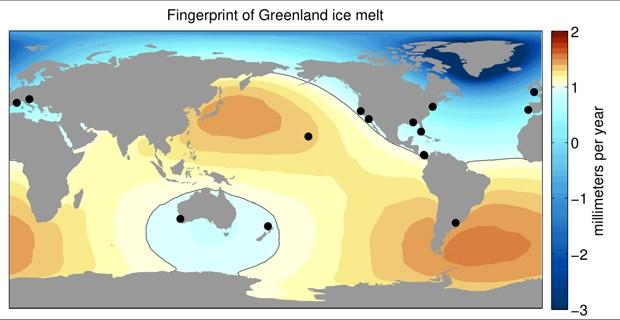520
NASA: scientists to underestimate the speed of the raising water level of the oceans

Approximately 71% of our planet's surface is covered by water, so the estimation of sea level change is one of the most important tasks that allow scientists to predict future changes of Earth's climate and living conditions of people living in different regions of the planet. To this day, scientists believed that know the dynamics of sea-level changes. This rise in sea level by 1.6 cm per decade since 1900. In any case, such data leads the National oceanic and atmospheric administration (National Oceanic and Atmospheric Administration, NOAA). The main reason for sea level rise — global warming.
The results of a new study published in the October edition of Geophysical Research Letters, suggests that scientists have underestimated this value. In some regions, raising sea level faster the generally accepted figure is about 5-28%. Global sea level, according to the study authors, increased to not less than 14 inches in the last hundred years, and in some regions — and all 17 inches.
The reason for this underestimation was revealed by scientists from the jet propulsion Laboratory of NASA and the University of Hawaii at Manoa. Comparing the parameters of current climate models with measurements of sea level in previous years, a team of climate scientists found that the readings of the coastal tides, may not be as significant as was considered, and such data cannot be used as a reference. The sensors located in many places in the Northern hemisphere, are the primary data source for measuring global sea level over the past few decades.
"This is not the situation when incorrect data or improperly working instruments. For a number of reasons the sea level is not changed equally across the planet," says Philip Thompson, Director of research. "As it turned out, our data are collected in areas where sea levels are rising least rapidly due to global warming."
Typically the metering station water level are stationary. In addition to the water level, these stations can determine the weather conditions of the region, including pressure and wind speed, factors that often affect the measurement of sea level.
The only problem in this whole situation — where such stations are located. According to the study, most of the stations located in the Northern hemisphere, where ice cover is melting faster than in the southern hemisphere.

As it turned out, the sea level changes more not where operates the main factor of changes in the level of ocean water. In fact, most actively this level rises in places remote from this factor. According to one source, melting ice in the Northern hemisphere of the Earth the greatest impact on raising the water level in the "South Pacific ocean and the equator".
The project team also believes that have found the reason why the consequences of the melting of ice can vary from region to region. For example, changes in China may differ significantly from changes in the U.S. or Africa. The rate of sea level rise is different in different regions due to the action of additional factors. It may be the winds, ocean currents, gravity, tides.

The consequences of the melting of ice in Greenland. Brown color shows the regions with record sea level rise
"This is very important because it is likely that the influence of certain winds or currents may be the cause of the underestimation of the rate of sea level rise," says Thompson. Scientist says that all this is not accidental, professionals need to change the speed of sea level rise upward. Climate scientists build a variety of predictions, but most experts agree on one thing — global warming really is, and it is causing the rapid melting of ice in both hemispheres. Professor Peter Wadhams (Peter Wadhams) from Cambridge, for example, argues that in this or the following years, the Arctic may be completely ice-free, which hasn't happened the last 100 thousand years.
This year we are seeing a new climate records. For example, each month of this year is the warmest in the entire history of observations. NASA representatives say that now the summer ice covers 40% less area than thirty years ago. If the Antarctic ice sheet will continue to melt, the sea level in the future rises to 3.6 meters, that'll just erase from the face of the earth a city located on the coast.
Source: geektimes.ru/post/282048/
After seeing this recipe, you don't want to cook the potatoes differently! Oh this looks delicious...
Difficult road to Mars























